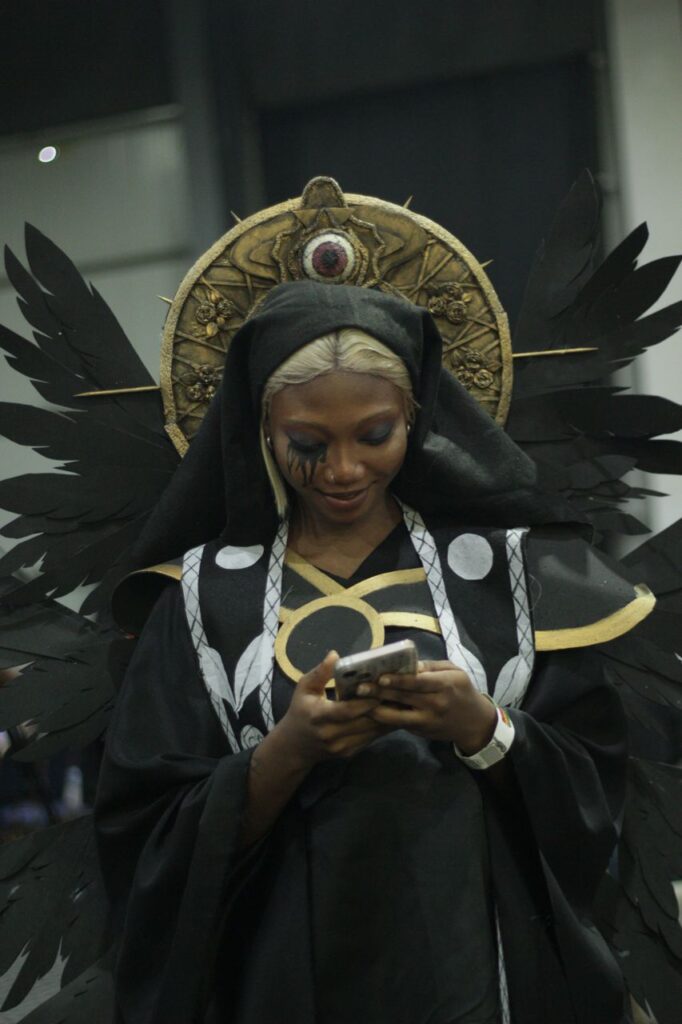“Stop dressing as someone else’s hero. Nigeria has its own and they deserve the spotlight.”
If you’ve ever been to Lagos Comic Con (or scrolled the festival tags), you’ve seen the spectacle: anime heroes, Marvel armor, and an ocean of pillow-perfect wigs.
But hidden in the crowd are something else , a slow, joyous rise of cosplayers wearing characters that actually belong to this soil: Guardian Prime, Iyanu, Ajaka and the rest.
That shift didn’t happen by accident. Lagos Comic Con turned cosplay from a niche hobby into a community ritual and now it’s quietly asking fans to cosplay local characters for love of the craft, not just cash.
From Corner Hobby to Mainstream Moment
What started as a small gathering in 2012 is now one of Africa’s biggest pop-culture events. The convention has steadily grown into a crowd that organizers estimate at roughly 6,000 attendees in recent years, and cosplay has become one of its biggest highlights.
Organizers now run major costume competitions and programming tracks that treat craftsmanship and character performance seriously.
That growth changed the cosplay ecosystem: more makers, more workshops, more local suppliers for foam, fabric, and props and more young people learning how to sew, sculpt, paint and perform. Cosplay is no longer just about buying a costume; it’s skills, entrepreneurship, and performance rolled into one.
Lagos Comic Con: The Engine of Encouragement
Lagos Comic Con didn’t just provide a stage, it added incentive. Its cosplay prize pool has grown, with organizers advertising prize money (for example N150,000 for winners) and official judging criteria that reward creativity and showmanship, not just screen-accuracy.
That money matters in a country where makers often fund their craft from side hustles.Minimie, the makers of the popular noodles brand, are once again throwing their weight behind the Lagos Comic Con cosplay competition, cementing their place as one of the biggest backers of geek culture in Nigeria.
This year, a total prize pool of about ₦500,000 is up for grabs, raising the stakes for fans and creators alike. Last year’s edition saw over 150 submissions, with only about 40 finalists making it to the grand stage to showcase their craftsmanship, creativity, and performance in front of a roaring crowd.
With Minimie’s continued support, the competition has grown into one of the most anticipated highlights of the convention, proving that cosplay in Nigeria is no longer just a side attraction it’s a full-blown cultural moment.
But the bigger impact is cultural. Coverage by outlets like OkayAfrica and community features have elevated cosplayers from oddities to artists.
Stories of cosplayers who swapped Marvel helmets for Guardian Prime capes, and got far more applause for doing so started to circulate, pushing a subtle rethink: why not flex our own stories on the stage?
Representation in Stitch and Foam
Why does this matter? Because cosplay is also story-making. When a kid sees a brown-skinned hero in full regalia on a Lagos stage, it changes the script.
Cosplayers embody identity in motion they act, they perform, they talk like the characters, and they bring local dialects, jokes, and mannerisms into the performance.
For a generation raised on anime and Hollywood, seeing Lagos landmarks, jollof-inspired motifs, or Yoruba patterns on a costume is a jolt of recognition.
Community pieces and interviews show that the Nigerian cosplay scene is more than costuming; it’s a support network that helps creatives practice prop-making, makeup, and stagecraft skills that translate into animation, theater, and design careers.
Many cosplayers credit Lagos Comic Con with giving them a first paid gig or a path into freelance prop work.

The Online Push: From Instagram to IRL Stages
Social media amplified everything. Hashtags, reels, and shoutouts turned single performances into viral moments. Local accounts and collectives sprouted to boost cosplayers, share tutorials, and even swap materials.
That online visibility helped Nigerian characters trend: a well-made Guardian Prime or a clever Iyanu rendition can rack up more authentic engagement than a generic imported costume because it hits home.
Why You Should Cosplay Nigerian Characters: Not Just For The Money
Cosplay competitions pay, yes but the real prize is cultural. Here’s why switching your next outfit to a Nigerian comic character matters:
Representation wins hearts. Kids in the crowd see themselves reflected, and that’s priceless.
You build local IP. Cosplaying local heroes builds hype for Nigerian comics and that attention helps creators secure deals, merchandise, and adaptations.
Skills translate. Making a unique, locally inspired costume pushes craft boundaries and boosts your portfolio for design/animation jobs.
Community credit. The crowd rewards originality; judges love concept and performance not just licensed accuracy.
It’s activism. Each local costume is a vote for African storytelling on the global stage.
How to Get Started (and Win Hearts, Not Just Cash)
Pick a character with a story you care about Guardian Prime, Malika, Iyanu, or someone from Spoof, Comic Republic, or Indie zines.
Share the origin story in your entry judges and audiences love context.
Use local fabrics and motifs to signal intent (Ankara trims, adire patterns).
Post process reels step-by-step content boosts your visibility and helps the community learn.
Mentor a newbie that reciprocity grows the scene.
The Final Panel: Cosplay as Cultural Care
Lagos Comic Con gave Nigerian cosplay a stage, a paycheck, and a spotlight. Now it’s asking the community to use that stage responsibly.
Cosplaying a Nigerian character is not about snubbing anime or the MCU, it’s about balance, about giving homegrown heroes their chance to breathe and be loved on the same red carpet.
So next con, skip the easy licensed build. Stitch up a local hero, tell their story, and watch how a single costume can ripple into fandom, IP growth, and a new generation of Nigerian storytellers.
Want a challenge? Tag your next Nigerian cosplay with #CosplayNaijaHeroes and we’ll feature the best ones in our community round-up.